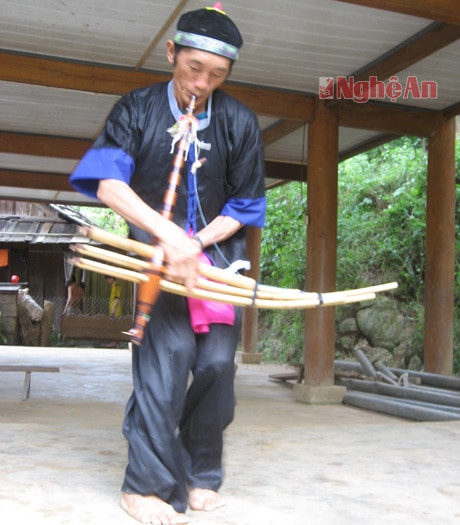Son Ha village artisans
(Baonghean) - Although he is 70 years old, Mr. Lau Chong Di, Son Ha village (Ta Ca commune - Ky Son) is still devoted to teaching the use of traditional musical instruments to the younger generation. He has passed on his passion for Mong flute music to many young people in the area. For that reason, Mr. Di is loved and respected by the people.
Mr. Lau Chong Di was born and raised in the border mountains of Ky Son, and has been attached to the Mong flute since childhood. According to him, when he was a boy, his father taught him how to play and dance the Mong flute. The boy learned very quickly, and in no time his flute's sound was smooth, his steps were graceful and rhythmic. When following his father to the fields, following his mother to the market, or when moving from village to village, the boy Lau Chong Di never forgot to bring his flute. When he was young, every time there was a market in the border area, Lau Chong Di often invited his friends to come here to dance with his flute. The sound of the flute had a strange attraction, making many girls flutter. Thanks to his ability to play and dance well with the flute, Lau Chong Di conquered the heart of the most beautiful girl in the village and married her.
When he had his own family, life became busier but Mr. Di still spent his free time on the sound of the panpipe and dance. On quiet nights, the people of Son Ha village often enjoyed the sound of the panpipe, sometimes low, sometimes high, sometimes whistling like the sound of the wind, sometimes murmuring like the sound of a stream... After a long time without listening to the sound of Mr. Di's panpipe, the people felt something was missing in their souls.
The more the socio-economic life develops, the more the village life changes and improves. That means the expansion of exchanges in all fields, including music. Many Mong ethnic youths follow strange songs and music, forgetting the musical identity of their ethnic group.
Faced with this reality, Mr. Lau Chong Di clearly recognized the risk of national music being lost and was extremely concerned about finding ways to preserve it. He always advised his family members to be conscious of preserving their identity. Listening to him, his children and grandchildren were all conscious of learning and were all proficient in using the panpipe, and were all able to sing the folk songs passed down from the past.
 |
| Mr. Lau Chong Di with the panpipe dance. |
Whenever he has the opportunity to meet with the youth, Mr. Lau Chong Di often tries to advise them to come to the sound of the Mong flute, the Cu Xia and Lu Tau melodies, because that is the spiritual heritage passed down from generations of ancestors, the "soul melody", the character and bravery of his people. Not only talking, Mr. Di always tries to prove it through each piece of music and dance. On holidays, New Year, weddings, parties, and festivals, he often comes and brings along the flute.
According to him, doing so is not to show off but only to make people around, especially the young generation, interested in their traditional musical instruments, so that the sound of the Khen will never be lost. He is happy that his work has been somewhat effective, many young people have come to him for guidance on how to use and dance the Khen. In particular, a few years ago, the Department of Culture of Ky Son district cooperated with the Institute of Traditional Music (Hanoi) to open a class to teach folk songs and traditional musical instruments, and he was invited to participate as an artist. Despite his old age, his strength and bones are no longer flexible, but in front of the students, Mr. Di still shows his passion in each piece of music and dance.
Talking to us, Mr. Lau Chong Di confided: “Every ethnic group has its own identity, expressed in many aspects such as housing, costumes, language and music. Adults must advise the young generation to be aware of preservation. I always want to contribute my small part to preserving the musical identity of my ethnic group, so that the sounds of the panpipes, dances and folk songs of the Mong people will never be lost.”
Cong Kien






